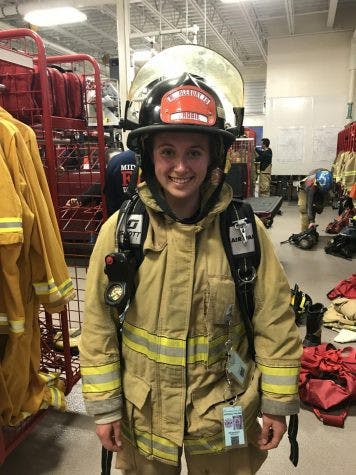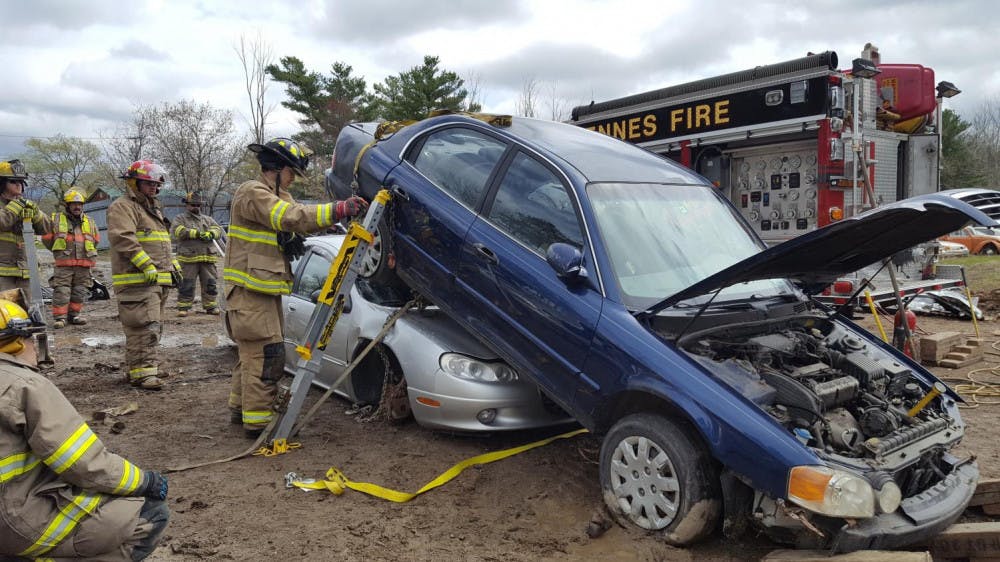It was mid-afternoon when David Cohen ’20 got the call. Two automobiles on a Vermont state highway had collided head on. One of the victims was still pinned in the driver’s seat, the car’s dashboard compressed on her lower body.
“I got suited up into the extrication gear, and started to do a medical assessment on the victim,” Cohen recalled. “She was talking to me and I was doing my best to calm her down, but there were people with big tools shouting at each other trying to cut metal apart. She was scared.”
After assessing the victim for several minutes, Middlebury EMS cut through the vehicle’s roof and lifted the driver up and out onto a stretcher. Cohen watched it all unfold: the ambulance quickly left for Porter Hospital, later transferring the victim by air to the University of Vermont Medical Center (UVMMC).
Cohen cites this story as his most memorable experience while working for the Heavy Rescue Team with the Ambulance Association in Middlebury. Raised in Princeton, New Jersey, Cohen worked with Princeton EMS during his time in high school. Now a junior at Middlebury, studying mathematics and physics, he volunteers his time for emergency services in town.
Cohen’s experiences are paralleled by those of a handful of other Middlebury students, who most commonly work shifts as first responders for Middlebury EMS and fire. Since 1970, the town of Middlebury has operated its own emergency medical response service, originally manning a single ambulance under the Middlebury Volunteer Ambulance Association (MVAA). Now, Middlebury Regional Emergency & Medical Services (MREMS) operates multiple ambulances and relies on upwards of 40 volunteers to operate their station off of South Street Since 1808, Middlebury has also maintained a local fire department under the Battell Hose Company. Until 1920, the organization had trouble recruiting and maintaining volunteers and other resources. Currently, Middlebury Fire relies on its 35 volunteers, and responds to emergencies across the county.
Liam Hahn ’21.5 volunteers his Wednesday nights as an overnight-shift EMT, and often finds himself awake in the early hours of Thursday morning. Hahn shrugged when asked about his Wednesday night sleep schedule.
“Some nights, we don’t get any calls,” he said. “Other nights, I don’t even touch my bunk.” As part of a team typically comprised of two primary EMT’s and a Middlebury student volunteer, Hahn has undergone extensive emergency training in order to respond to every call in the playbook, from a non-emergency patient transfer from Porter Hospital to UVMMC, to a homicide incident.
Hahn’s emergency medical experience started before he came to Middlebury. In his home state of Colorado, Hahn worked for ski and mountain bike patrol at Steamboat Resort for two years, responding to skiing accidents and emergency situations on the 2,900-acre trail system. Having obtained his EMT certification before his first year at Middlebury, Hahn was already prepared for his experiences as a responder here.

Middlebury Fire Volunteer Halcyon Brown ’21.5, suited up in her gear.
“My experiences at Steamboat have taught me a lot about working with a team,” Hahn said. “A lot of what we do [at Steamboat] relies very heavily on teamwork to get patients safely down the mountain. [Patrolling] has also taught me a lot of the little things that I can do to help either a Paramedic or an Advanced EMT so that they can focus on some of the more important interventions while I take care of [other tasks] within my scope of practice.”
Halcyon Brown ’21.5 is a volunteer firefighter at Middlebury Fire, and a member of their Technical Rescue Team.
“[Fire-fighting] crept into my mind, but I’m not really sure how it got there,” said Brown. “My uncle was a volunteer firefighter when I was a kid, so maybe I was getting subliminal messaging from a young age.”
Like all volunteers, Brown is on call 24/7, with a pager by her waist. When dispatch signals an incident, she needs to act quickly.
“I hear the tone, then run down the fire department. It’s a quick turnaround: you need to get your gear and headset on, and catch a truck,” she said. “It’s cool because you don’t really know where you’re going to go, nor what and where it’s going to be.”
Brown also commented on the minutemen-style of preparedness that so many rural fire departments rely on. “Most volunteers have other jobs. One guy is a mailman, another drives a tow truck, another a fuel truck, and I know someone who does woodworking on the side,” she said
For all student responders, emergency care ends when victims are brought to the hospital; it is not expected for first responders to cross paths with the patients again. For Cohen, the automobile collision victim was one of many routine faces he would never expect to see again.
On a non-emergency transfer call from UVM to a rehabilitation center in Addison County three weeks ago, Cohen noted something unique about the patient he was relocating.
“She mentioned she had been in a car crash, and her voice sounded familiar,” he said. “I put it together that it was the same person [from the highway accident]. I wasn’t expecting a positive outcome from the crash, but it was just awesome to talk to her, and to tell her I was the guy in the car. She didn’t remember me at all, but to see her fully on the road to recovery was the highlight of my EMS career.”
Cohen, Hahn and Brown plan to continue working for Middlebury EMS in their remaining time at Middlebury College. To learn more about Middlebury Fire and EMS, visit middlebury911.org and middleburyfiredept.org.
First Responders: Middlebury Students Take to Local EMS and Fire

Courtesy Photo/ David Cohen
Members of MFD and MREMS, stabilize and extricate an “underride” during an advanced extrication class taught by members of Middlebury EMS Heavy Rescue Team as part of the Addison County Fire School.
Members of MFD and MREMS, stabilize and extricate an “underride” during an advanced extrication class taught by members of Middlebury EMS Heavy Rescue Team as part of the Addison County Fire School.
Scott Selleck
Comments



